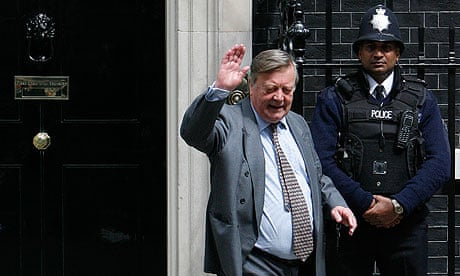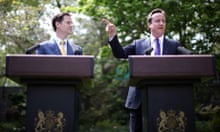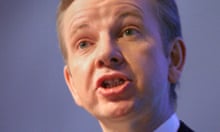Britain's first coalition government since 1945 set to work this morning with the prime minister, David Cameron, handing out cabinet positions to Conservative allies and new Liberal Democrat coalition partners.
Cameron posed with the new deputy prime minister, Nick Clegg, on the steps of No 10 before announcing that the former chancellor Ken Clarke will become justice secretary and Lord Chancellor. Theresa May, until now the shadow work and pensions minister, will be home secretary, becoming only the second woman to hold the office after Jacqui Smith in the last Labour government. May will also be women's minister.
Arriving at Downing Street in his trademark grey suit and brown suede shoes, Clarke, a 69-year old former secretary of state for health, education and home affairs, was asked how it felt to be back. "Seems familiar," he replied.
The Tory chairman, Eric Pickles, is reported likely to become communities secretary, proving correct Peter Mandelson's warning that if voters flirt with the Liberal Democrats they are likely to wake up the next morning "not just with David Cameron but... heaven forbid, Eric Pickles as well."
Within hours of becoming prime minister and entering Downing Street last night, Cameron appointed George Osborne to the role of chancellor, William Hague as foreign secretary, Liam Fox as defence secretary and Andrew Lansley as health secretary. Clegg's chief of staff, Danny Alexander, was announced as Scottish secretary. Iain Duncan Smith, the former Tory leader and chairman of the Centre for Social Justice, was expected to be appointed secretary of state for work and pensions.
Among the Lib Dems, Chris Huhne, the party's home affairs spokesman, was expected to be announced as energy and climate change secretary, while the deputy leader, Vince Cable, has been given responsibility for "business and banks" as business secretary. The Lib Dem education spokesman and former banker, David Laws, will be chief secretary to the Treasury, leaving the position of education secretary to the Tory education spokesman, Michael Gove.
There are expected to be a total of about 20 Lib Dems in government jobs, mostly in junior positions.
The Conservative justice spokesman, Dominic Grieve, is expected to be made the attorney general. Baroness Warsi, the party's spokeswoman on community cohesion and social action, and Francis Maude, shadow cabinet office minister, arrived at Downing Street to meet Cameron at lunchtime.
Patrick McLoughlin, the Tory chief whip will continue as the government chief whip.
The Conservative mayor of London, Boris Johnson, said the coalition looked like "a kind of cross between a bulldog and a chihuahua".
"They've created a mongrel breed," he said. "And like all mongrel breeds I think it will have a great deal of hybrid vigour and strength."
Details were emerging of the government's programme, with the Tories making good on the pre-election pledge to make a "significant acceleration" to reduce the budget deficit – including £6bn of spending cuts this year. An emergency budget will take place within 50 days, with Clegg's Lib Dems tailoring their pre-election pledge to delay the timing of deficit reduction to now agree with the Tory analysis that cuts should start immediately.
The parliament will sit for a fixed five-year term and there will not be another election until 7 May 2015, unless 55% of MPs vote for an earlier election.
The Lib Dems have dropped plans for a "mansion tax" on properties costing more than £2m, while the Conservatives have ditched their pledge to raise the inheritance tax threshold to £1m.
David Miliband is expected to announce he will run for the role of Labour leader this afternoon – becoming the first of the potential contenders to throw their hat in the ring. This morning he was given the support of the former home secretary Alan Johnson, who could have been a candidate himself.
"I think David is the greatest talent. I think he's a remarkable politician. And I think his talent is to put very complex ideas into clear language," Johnson told BBC Radio 4's Today programme.
There is mounting speculation that Miliband will be challenged by his brother Ed, the former energy and climate change secretary. The former schools secretary Ed Balls is also likely to run for the post. Balls's wife, Yvette Cooper, ruled herself out.
In a message to supporters today, Cameron said: "The great news is that after 13 years, our party is back in government ... We have seen the election of nearly 100 extra MPs, we have gained more seats than in any election since 1931 and we are now the party of government once again. No one should underestimate the scale of our achievement in such a short space of time, and it would not have been possible without your support and commitment to the cause."
Defending the deal with the Lib Dems, Cameron said: "Today, we have achieved this much-needed agreement, overcoming political differences to forge a new government in the national interest. Of course, we must recognise that all coalitions are about compromise.
"The agreement commits the next government to a significantly accelerated reduction in the budget deficit, to cut £6bn of government waste this financial year and to stop the jobs tax ... We have protected our nuclear deterrent. And there will be no amnesty for illegal immigrants, nor the handover of any additional powers to the EU.
"Of course, the agreement also reflects the key priorities and objectives of the Liberal Democrats. This includes fairer funding in education, a fairer tax system and political reform – including a referendum on changing the voting system to the alternative vote."




